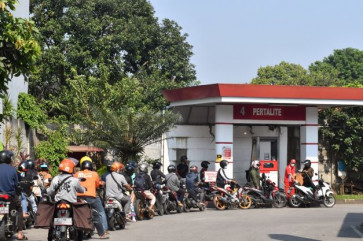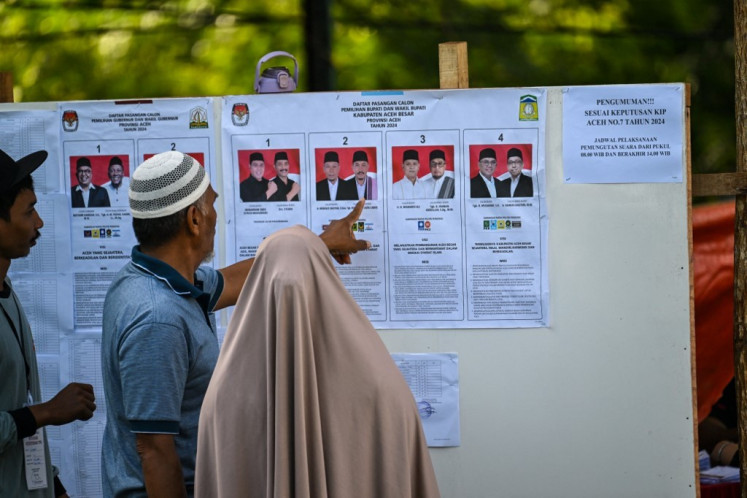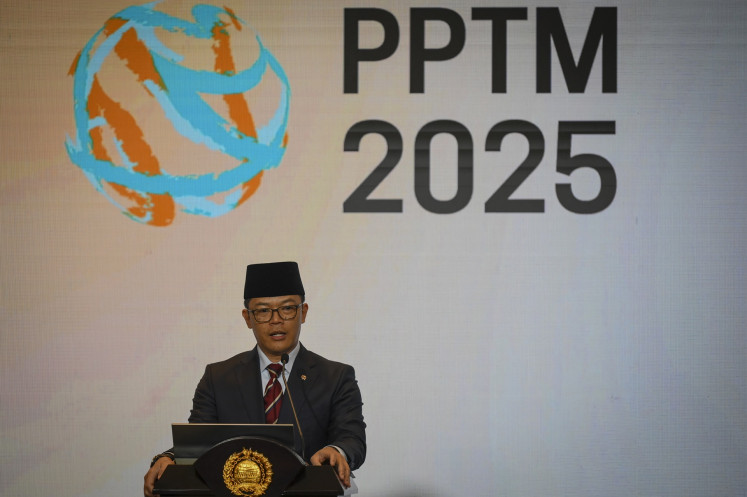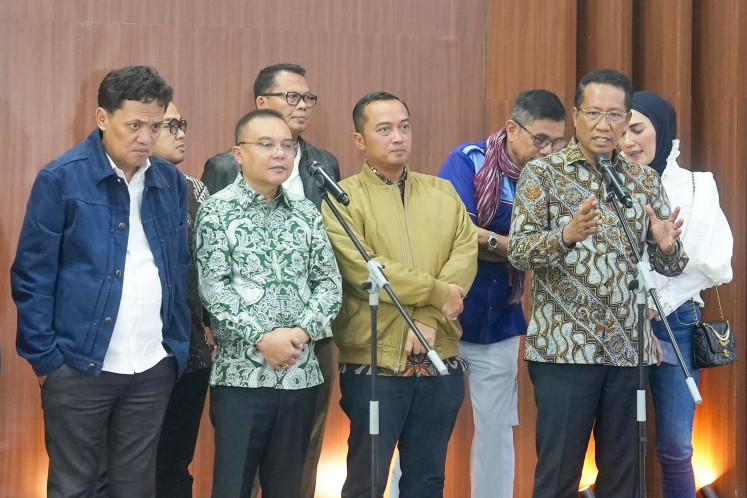Popular Reads
Top Results
Can't find what you're looking for?
View all search resultsPopular Reads
Top Results
Can't find what you're looking for?
View all search resultsPalu residents benefit from bio-gas plant
Environmentally friendly teamwork: Tony Zeterfeld (right), a representative of Bio Gas Systems, gives an overview of operations at the bio-gas plant located at the Kawatuna dump site in Palu, Central Sulawesi
Change text size
Gift Premium Articles
to Anyone
 Environmentally friendly teamwork: Tony Zeterfeld (right), a representative of Bio Gas Systems, gives an overview of operations at the bio-gas plant located at the Kawatuna dump site in Palu, Central Sulawesi. (JP/Ruslan Sangadji) (right), a representative of Bio Gas Systems, gives an overview of operations at the bio-gas plant located at the Kawatuna dump site in Palu, Central Sulawesi. (JP/Ruslan Sangadji)
Environmentally friendly teamwork: Tony Zeterfeld (right), a representative of Bio Gas Systems, gives an overview of operations at the bio-gas plant located at the Kawatuna dump site in Palu, Central Sulawesi. (JP/Ruslan Sangadji) (right), a representative of Bio Gas Systems, gives an overview of operations at the bio-gas plant located at the Kawatuna dump site in Palu, Central Sulawesi. (JP/Ruslan Sangadji)
E
span class="caption" style="width: 595px;">Environmentally friendly teamwork: Tony Zeterfeld (right), a representative of Bio Gas Systems, gives an overview of operations at the bio-gas plant located at the Kawatuna dump site in Palu, Central Sulawesi. (JP/Ruslan Sangadji)
Impoverished residents in Palu, Central Sulawesi, can now enjoy an electricity supply day and night through a bio-gas plant jointly built by the Palu administration in Central Sulawesi and the Boras city administration in Sweden.
'Previously, we lived in modest homes built from used cardboard. At night, we used to light kerosene lamps, but now we live in better homes, connected to the power grid day and night,' said 53-year-old resident Mulia.
Mulia is one of around 80 scavengers eking a living from sifting through trash and then selling it at the landfill site in Kawatuna subdistrict, Mantikulore district, Palu.
Mulia can earn between Rp 300,000 (US$26) and Rp 400,000 monthly from this activity, which hardly meets the needs of her three children.
However, due to the lack of job opportunities she faces, she has been forced to earn a living amid the heaps of trash.
Unlike Mulia, Andriani, 47, also a scavenger, is relatively more productive thanks to her younger age. She collects plastic, cardboard, cans and bottles at the site. Buyers visit each month to weigh and pay for the recyclable items.
'I can get between Rp 600,000 and Rp 1 million each month,' said Andriani.
The Palu municipality says scavengers must be empowered and should live in better quality homes.
It established communications with the Boras city administration in Sweden to build a bio-gas plant and provide living quarters for the scavengers and their families.
The partnership also provides them with free electricity from the bio-gas plant built near the Kawatuna landfill, Central Sulawesi Governor Longki Djanggola said.
The plant processes waste from the landfill site to produce methane to generate 20,000 kilowatts per hour (kWh), which will then be provided to underprivileged residents in the Palu city area.
However, the free electricity cannot yet be distributed to the urban poor as the power network is monopolized by state power firm PT PLN.
Longki hoped PLN could exploit the electricity from the bio-gas plant and distribute it to underprivileged people.
According to Longki, the partnership between Palu and Boras was the biggest boon for people in the region.
However, the joint venture has been impeded by confusing regulations.
Palu Mayor Andi Mulhanan Tombolotutu said the waste-based power plant where the generators were driven by methane from the waste, was able to generate 800 kWh of power that could be connected to 2,780 homes of impoverished residents.
'Every household will later obtain between 900 and 1,200 watts of electricity,' said Andi.
Palu, he said, produces 631 cubic meters of trash daily and can produce 228 tons of methane daily.
The plant can also produce 283 tons of CH4 methane and 564 tons of carbon dioxide annually.
From the volume of waste, added Andi, the plant could produce 0.32 tons of nitrogen, 16.14 tons of hydrogen sulfide and 10.17 tons of oxygen annually.
'Earnings from the carbon trade alone are estimated at $1.2 million annually,' Andi went on.
'Consequently, we are able to supply 2,780 kWh of power to 705 households and the city can earn Rp 96,836 billion from electricity annually,' he added.
Andi, who is also the head of the Palu administration's domestic waste recovery program, pointed out that the bio-gas plant would produce methane from waste at the Kawatuna landfill to drive the power generator.
Separately, Boras administration science partner project manager Jessica Magnuson, said that her party would develop research in cacao shell waste in Palu to be processed into methane.









